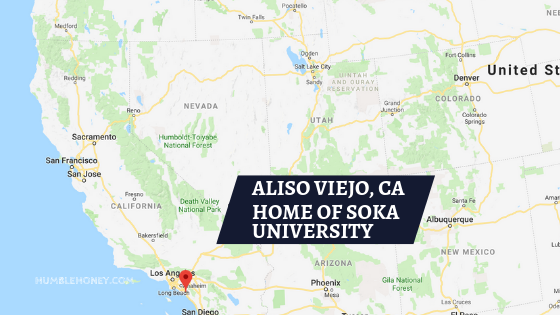The biggest problem with teacher recommendations and how that influences admissions decisions. Name-dropping university staff in admissions essays. How thorough school research can trump a lower GPA. How leaves of absences during high school affect a student’s chances of getting in. Soka University admissions officer gives SocratesPost rare insights on the biggest questions we have. This week, we continue our in-depth conversation with Aaron. Plus, based on the suggestion of a reader, here’s a city profile on Aliso Viejo, California — home of Soka University.

Our take on Aliso Viejo, CA — home of Soka University:
Located midway between Los Angeles and San Diego in California, Aliso Viejo is a coastal suburban community (pop. 52k) alongside the Pacific Ocean. SocratesPost is headquartered just 30 minutes away and we can confirm Aliso Viejo has lovely weather, sunny skies and low rainfall throughout the year. It’s adjacent to some retirement communities, many wilderness parks, and the world-class Laguna Beach. Some might consider it a boring town but it’s safe, quiet launchpad to outdoor activities. In fact, many Orange County residents drive to Aliso Viejo to hike, mountain bike, and run the hills. However, if you’re looking for a city experience with nightlife and cultural opportunities, you would have to drive 1.5 hours up to Los Angeles or 2 hours down to San Diego. It’s not exactly a small town, however. There are shopping plazas with restaurants and stores within Aliso Viejo. Less than 30 minutes are larger cities like Costa Mesa and Irvine, which boast more attractions for college students. Keep in mind that Aliso Viejo is a suburban city with homes and shopping centers very spread out. Public transportation is virtually non-existent and students would need a car to get around.

Exclusive Insider Interview: Admissions Officer, Soka University

SocratesPost: What’s a big issue you see in the teacher recommendations that students submit to Soka?
Aaron at Soka: Certainly proofreading. it was a big sort of issue that had come across I guess more so this year than in years past. I know depending on where you are, which school districts, and your caseloads. It’s can be really high and it’s hard to just crank out just volume of letters of recommendation. But I think it’s tough whenever you have either the wrong university or college name in the letter, or moreso the students name.
So if I’m reading about Jane and all of a sudden we’re talking about Steven on the same page midway through, I am wondering if these are Steven’s extracurriculars or now Jane’s. It could sway a decision one way or another. It’s in the students, well, counselors’ best interest to look out for this student. I don’t know if there’s a way that you can proofread or maybe you can have TA’s come in and read your letters day to day. But if there’s one way to kind of catch those errors, I think that’d be really helpful to us. Because again, you want to have sort of the full scope of the student on the letter.
SocratesPost: How does that affect your opinion of the applicant when their teacher messes up the recommendation?
Aaron at Soka: If it’s a teacher? I’m kind of questioning their relationship. I think to a certain extent when it’s a counselor, I’m much more lenient. School counselor, you’ve got 500 plus students. With a teacher, it’s kind of surprising. I’ll wonder, “Did you really have a good relationship with that individual? Are you as close knit as you say you were?” It can kind of hurt, but I don’t hold it 100% heavily against a student. I know that sometimes you’re scrambling to get letters. Sometimes you have a teacher that you really want to learn from. But they’re swamped or they have a cap for the year. “I can’t write more than 35 because I want them to be so high quality.”
SocratesPost: That’s true.
Aaron at Soka: And we’ve all been there, well, the number of us had been there. I do my best to keep it all in perspective.
SocratesPost: What are some other aspects that frustrate you when you read applications? One thing that you mentioned last time was when they tried to name drop who’ve they met at Soka, that’s one thing. So can you talk a little bit about that and then anything else that frustrates you?
Aaron at Soka: Whenever you’re writing a letter, we’re going to know who’s on campus, who works in what department, who the deans are, et cetera. I’d really rather hear more from you and why you feel you want to be at the university specifically. The fact that you’ve talked to a coach and talked to a dean, it’s all good stuff, but we know who our colleagues are and we know that they are definitely, hopefully great ambassadors for the school. I would just continue to draw from those conversations and hopefully sort of sew that into your essay in one way or another; take what you learned from them and kind of recreate a better, stronger understanding of the university. Writing about the people you met doesn’t do much for you necessarily.
SocratesPost: One thing I’ve heard college consultants say is that admissions officers want to be surprised in any way they can be. It doesn’t matter if you’re not following the rules as long as you surprise them. What do you think?
SocratesPost: I recently read in the news, some colleges are extending their application deadlines because they are struggling to meet their enrollment numbers and they’re unsure because of how the common app works if those students will actually matriculate and commit to that school because it’s so easy to send out eight different applications now. What is your take on that? Is that something that you’re concerned about and how do you work around that?
SocratesPost: So in the last week or so since our last meeting, have you learned anything new or have you experienced anything noteworthy when reading applications?
SocratesPost: What do you mean by profound?
SocratesPost: If their ability to articulate the school’s history and values matches with their own values, how does that help their application? If maybe their grades or their recommendations or other parts of their application just aren’t that good, does it offset it just because they’re so interested and so knowledgeable about the school?
SocratesPost: Interesting. I had some readers write in and ask how do colleges look at leaves of absences during high school? How should they approach that so that they don’t jeopardize their chances of getting into the colleges they want to?
